Cenotes, the mystical sinkholes of Mexico’s Yucatan Peninsula, beckon adventurous divers to explore their enchanting underworld. Descending into these crystal-clear waters, one discovers a breathtaking landscape where ancient Mayan culture converges with the natural wonders of stalactites, stalagmites, and sunlight-dappled caverns. This immersive experience not only showcases the region’s stunning beauty but also invites visitors to uncover the spiritual significance these sacred sites held for the indigenous people. As you delve deeper into the cenotes, the past and present converge, revealing a world that few have the privilege to witness.
Key Points
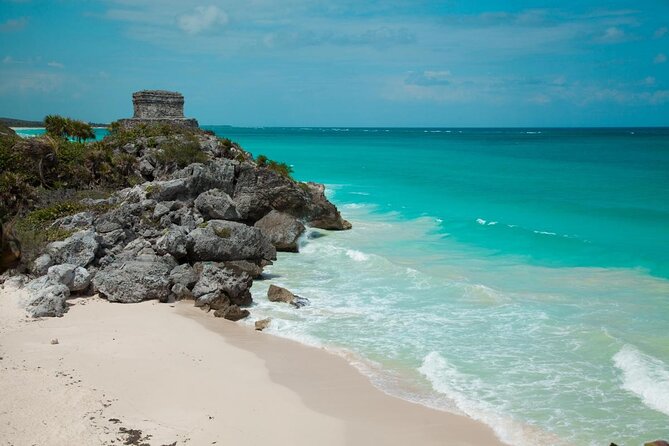
- Cenotes, sacred sinkholes in the Yucatán Peninsula, offer a unique diving experience into the Mayan underworld with crystal-clear waters and intriguing rock formations.
- Proper preparation, including specialized gear, safety briefings, and physical fitness, is crucial for safe and enjoyable cenote diving.
- Cenote diving showcases the natural beauty of these subterranean landscapes, with sunlight-dappled caverns, diverse aquatic life, and ancient Mayan artifacts.
- Cenotes hold immense cultural significance for the Mayan people, serving as sacred sites for spiritual practices and as vital water sources.
- Cenote diving allows visitors to enjoy the rich cultural heritage and natural wonder of the Mayan underworld.
Exploring Cenotes: Mayan Underwater Wonders

What’re cenotes, these captivating natural wonders hidden beneath the lush Yucatan Peninsula?
Cenotes are natural sinkholes that were formed by the collapse of limestone bedrock, exposing the groundwater beneath.
These mysterious underwater caverns were considered sacred by the ancient Mayans, who believed them to be gateways to the underworld.
Diving into these crystal-clear pools reveals a world of stalagmites, stalactites, and intricate rock formations, all carved by millennia of water erosion.
Exploring these subterranean marvels offers a unique glimpse into the Mayan culture and the stunning natural beauty found beneath the surface of the Yucatan.
Ready to go deeper? More scuba adventures we love in Cancun
Preparing for the Cenote Dive
Before embarking on the captivating cenote dive, divers must ensure they are properly prepared. This includes reviewing the necessary equipment, understanding the dive plan, and familiarizing themselves with the unique underwater environment. The following table outlines the essential gear and considerations for a successful cenote exploration:
| Gear | Preparation | Safety | Mindset |
|---|---|---|---|
| Scuba Gear | Review Buoyancy Control | Dive Buddy System | Embrace the Unknown |
| Underwater Lights | Check Equipment Functionality | Adhere to Depth Limits | Maintain Calm Composure |
| Protective Clothing | Practice Navigation Techniques | Monitor Air Consumption | Focus on the Experience |
| Dive Computer | Familiarize with Cenote Features | Communicate with Guides | Appreciate the Mayan Heritage |
Equipment and Safety Considerations
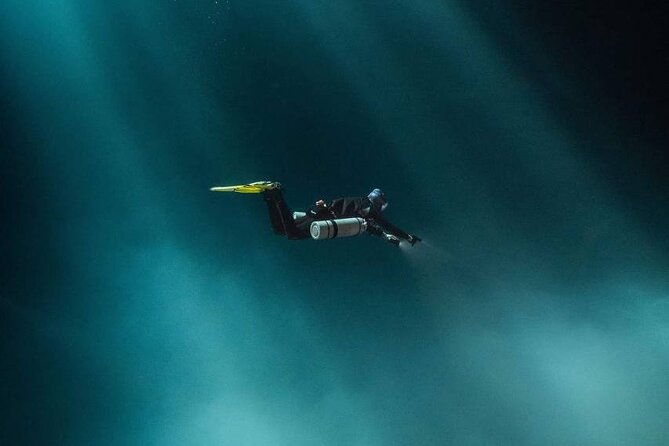
Proper equipment and safety considerations are paramount when exploring the captivating cenotes of Mexico’s Riviera Maya. Divers are outfitted with state-of-the-art scuba gear, including high-quality regulators, buoyancy control devices, and wetsuits to keep warm in the chilly, crystal-clear waters.
Guides provide thorough safety briefings, ensuring participants understand navigation techniques, emergency procedures, and environmental considerations. A moderate level of physical fitness is required, as the dives involve some swimming and maneuvering through the unique cave systems.
Participants must also disclose any medical conditions that could pose risks during the activity. With proper preparation and expert supervision, divers can safely and responsibly enjoy the mystical Mayan underworld.
Discovering the Underworld’s Beauty
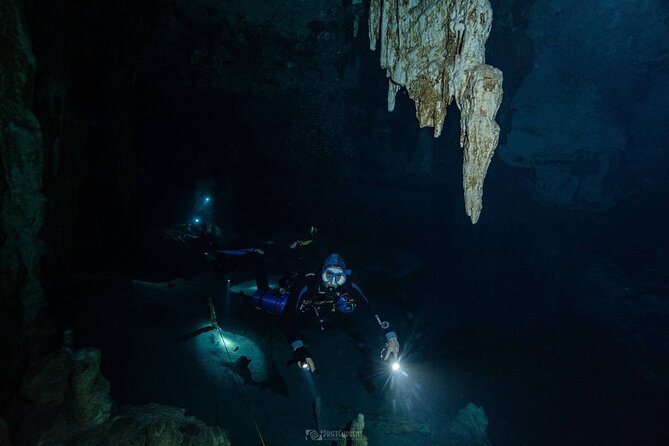
Descending into the ethereal caverns of Mexico’s cenotes, divers are captivated by a world unlike any other.
These underwater caverns, formed by the collapse of limestone bedrock, reveal a breathtaking landscape of stalactites, stalagmites, and crystal-clear waters.
Divers can witness:
- Sunlight filtering through the openings, casting an ethereal glow onto the water.
- Schools of freshwater fish darting through the caverns, amidst the intricate rock formations.
- Ancient Mayan artifacts and underwater cave paintings, providing a glimpse into the region’s rich cultural heritage.
- The eerie silence, broken only by the gentle sound of bubbles and the occasional echo of a diver’s movements.
This otherworldly environment offers a truly remarkable and unforgettable diving experience.
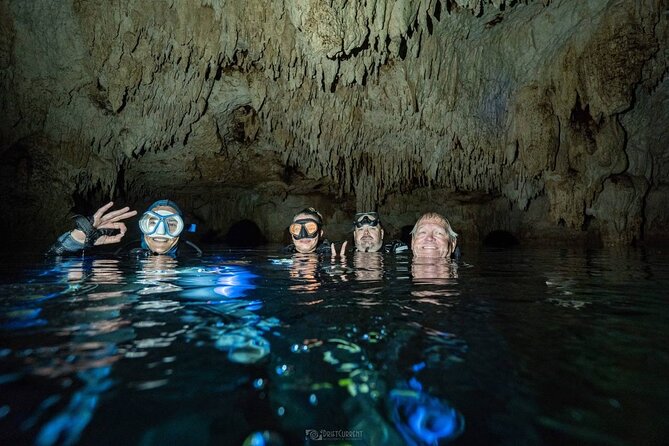
Navigating the intricate underwater labyrinth of a cenote requires careful planning and execution. Divers must be skilled in negotiating the narrow passages, avoiding any potential hazards, and maintaining a steady pace to conserve air. The cenote’s layout can be complex, with chambers branching off in multiple directions, necessitating a keen sense of direction and spatial awareness.
| Navigation Tips | Hazard Avoidance | Air Management |
|---|---|---|
| Follow guide lines | Watch for overhead obstacles | Regularly check tank levels |
| Use a compass or underwater navigation system | Be mindful of silty areas that reduce visibility | Adjust your breathing rate to conserve air |
| Memorize the route during the initial descent | Avoid contact with the delicate cave walls and formations | Communicate with your dive buddy about air usage |
Cultural Significance of Cenotes
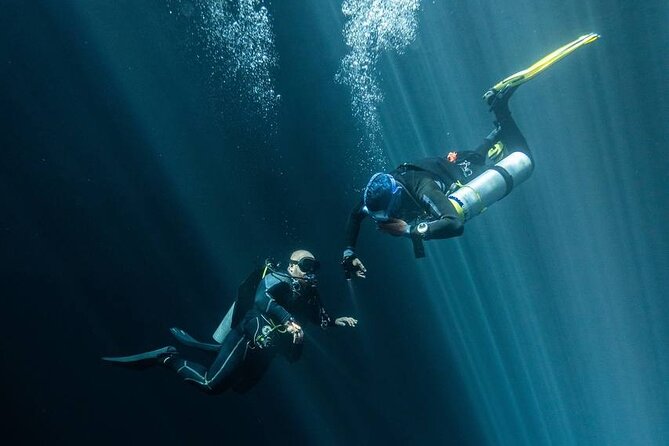
The cenotes of the Yucatán Peninsula hold immense cultural significance for the Mayan people, who’ve long revered these natural wonders as sacred and mystical spaces.
Cenotes were believed to be portals to the underworld, and were used for religious rituals, offerings, and even human sacrifice.
Some key aspects of the cultural significance of cenotes include:
-
Sacred Spaces: Cenotes were considered sacred sites where Mayans could commune with the divine and ancestral spirits.
-
Water Sources: The fresh water of cenotes was essential for sustaining Mayan communities and agriculture.
-
Mythological Significance: Cenotes were associated with deities and were believed to be the entrance to the underworld.
-
Archaeological Importance: Cenotes have yielded valuable archeological artifacts and remains, shedding light on Mayan history and culture.
Memorable Moments Beneath the Surface
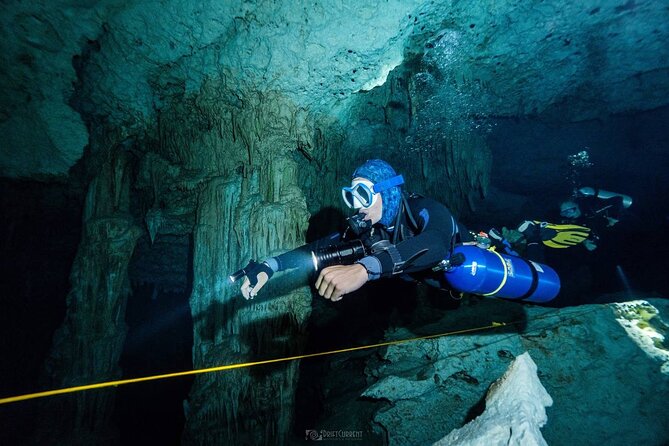
Beneath the surface, divers often find themselves mesmerized by the ethereal beauty of the cenotes.
The otherworldly rays of light filtering through the crystal-clear waters cast a magical glow, illuminating the intricate limestone formations and shedding light on the diverse marine life.
As divers navigate the subterranean caverns, they may encounter schools of fish, curious cave creatures, and even hidden archaeological artifacts left behind by the ancient Mayans.
With each breath, the senses are heightened, and the connection to the mystical Mayan underworld becomes palpable.
Every dive is a journey of discovery, offering a glimpse into a realm that few have the privilege to explore.
Frequently Asked Questions
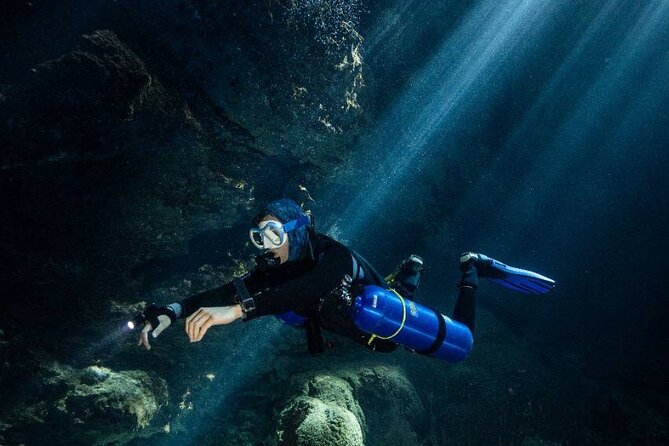
Are Children Allowed to Participate in This Activity?
Children are allowed to participate in this activity, but it’s not recommended for young children. The moderate physical fitness level required makes this activity more suitable for older children and adults.
What Is the Maximum Group Size for This Tour?
The activity is a private tour, so the group size is limited to only your party. The listing doesn’t specify a maximum group size, but it notes the experience is for your group alone.
Can I Bring My Own Scuba Equipment?
No, participants cannot bring their own scuba equipment. The activity includes the use of all necessary scuba gear provided by the tour operator. Guests are expected to use the equipment provided as part of the tour experience.
Is There a Minimum Age Requirement for Participants?
The activity has no minimum age requirement, but it’s not recommended for young children. Participants must be capable of moderate physical activity and have no serious medical conditions. The tour is suitable for most travelers aged 12 and above.
Can I Take Underwater Photos/Videos During the Dive?
Participants can take underwater photos and videos during the dive. The tour provides scuba equipment, including cameras, for capturing the stunning cenote environment. However, bringing one’s own underwater camera equipment is also permitted.
Recap
Diving in cenotes offers a unique opportunity to take in the mystical underworld revered by the ancient Mayans. This enchanting experience not only showcases the breathtaking natural beauty of these sacred sites but also deepens one’s appreciation for the Mayan culture and its profound spiritual connection to the underwater world. Cenotes continue to captivate explorers, inviting them to uncover the secrets of the Mayan past and the wonders of the present.
More Scuba Diving Tours in Cancun
- Five Hour Diving Class for Beginners in Morelos
- UNDERWATER MUSEUM CANCUN Diving for Beginners 1 Dive – Experience With Ticket
- Underwater Museum : Discover Scuba Diving Experience
- Cancun or Isla Mujeres Reef Diving for Beginners
- Cancun: Diving the Underwater Art Museum With 2-Tank Dive
- Cancun: Diving the Sunken Ship (Certified Divers)
More Tour Reviews in Cancun
Not for you? Here's more things to do in Cancun we have recnetly reviewed
- 5 Best Canoe And Kayak Experiences In Cancun
- 10 Best 2 Day Tours In Cancun
- 16 Best Canoe And Kayak Experiences In Cancun
- 25 Best Dining Experiences In Cancun
- 17 Best Full-Day Tours In Cancun
- 2 Best 3 Day Tours In Cancun
- 12 Best Photography Experiences In Cancun
- 25 Best Dinner Tours In Cancun
- 25 Best Cruises And Boat Tours In Cancun
- 15 Best Jet-Ski Experiences In Cancun
- 25 Best Lunch Experiences In Cancun
- 21 Best Food Tours In Cancun
